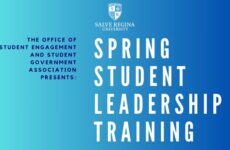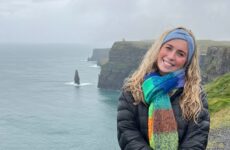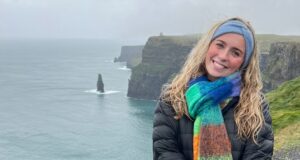By Marrissa Ballard | Staff Writer
Salve Regina recently received a $64, 600 grant from the Davis Educational Foundation, which will be used to pilot alternative pedagogy in the classroom.
The money is for a one-year planning grant. The Davis Educational Foundation’s official statement regarding the grant is as follows: “The grant was received from the Davis Educational Foundation established by Stanton and Elisabeth Davis after Mr. Davis’s retirement as chairman of Shaw’s Supermarkets, Inc.”
Dr. Chad Raymond and Dr. Traci Warrington, as chairs of the Faculty Innovation Taskforce, will be directing the project. “What we’re doing is looking at how to enhance student learning and engagement in the classroom by offering more opportunities for active or experiential learning,” Warrington said.
The grant money will be used to explore an alternative pedagogy called the “flipped classroom.” In a flipped classroom, the students’ homework is to read and watch recorded lectures online, while class time will be used for applying the ideas in the chapter.
During class, students will use case studies or real-world examples to apply the material they learned. For example, a marketing class might use concepts from the chapter to plan a marketing campaign for a product or company.
By watching the lectures ahead of class, students come prepared with the knowledge they need and can then work on applying that knowledge. It would also allow professors to spend less time lecturing, and more time taking a “deeper dive” into the concepts, according to Warrington.
“If you spend the whole hour and fifteen minutes delivering the content, you don’t ever get the chance to explore the concepts more,” Warrington explained.
In the Fall 2015 semester, Principles of Marketing will be offered as a flipped class, according to Warrington. It will meet once a week, where students will have opportunities to ask questions about the chapter and then apply what they read. Warrington explained how the students might get the opportunity to work with local businesses with the concepts they have learned.
Warrington is looking forward to exploring this new classroom method. “It’s really interesting to look at how different students learn, and how I can change how I teach to be more effective,” Warrington stated.
This type of alternative pedagogy is not new to Universities, and it is not new to Salve, according to Dr. Warrington. Some graduate Nursing classes take place in flipped classrooms. The class being offered in the fall will be the first official flipped classroom for undergraduates at Salve.
“I use alternative pedagogies like the flipped classroom all the time because it’s more fun for me as a professor to teach that way,” Dr. Chad Raymond stated. “Nothing bores me more than to stand in front of a podium and recite a lecture for seventy-five minutes, and if it’s boring for me, I’m sure it’s boring for students as well.”
Another feature of the flipped classroom model is that other sources will be incorporated into the online material. “It’s almost like a ‘panel of experts’ approach,” Warrington stated. “For example, if we’re looking at marketing, I may be able to reach out to an ad executive in New York City.”
The online content could also include reaching out to other departments. If students were learning about consumer behavior, the professor could reach out to a Psychology professor to give some insight on the subject.
Because keeping a student at an online lecture for an hour could be difficult, lectures would be ten to fifteen minutes, rather than an hour, according to Warrington.
The lecture will also be complimented with other videos and content from those outside sources and experts. “What would have been an hour and fifteen minute lecture to you by one person is now going to be a variety of pieces, delivered by a variety of people,” Warrington stated.
The pilot class will be a learning experience not only for students, but also for Salve faculty members. “With the grant we aim to show faculty ways of teaching that might work better for them than what they do now,” Raymond stated.
According to Raymond, alternative pedagogies have been proven as more effective for how much students learn in the classroom. “People have to take responsibility for their learning, which means being an active participant in it, and that’s what these pedagogies are all about,” Raymond explained.













